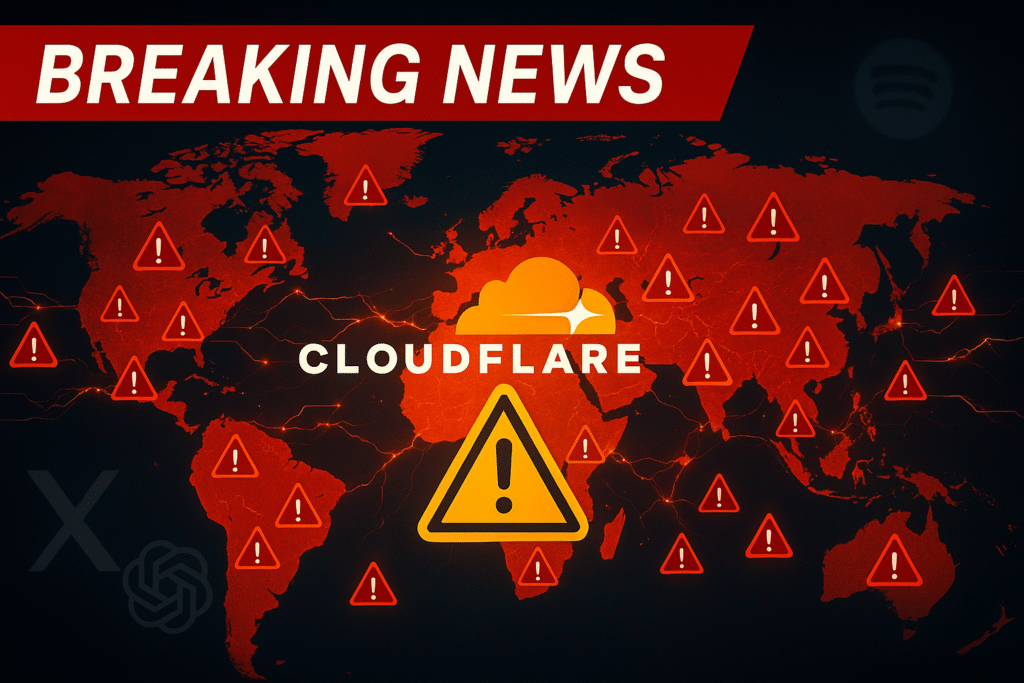Breaking News Update: November 18, 2025
This morning, a massive portion of the internet stopped working. X (formerly Twitter), ChatGPT, Spotify, Facebook, Claude AI, and countless other major platforms went dark for hours, leaving millions of users staring at error messages. The culprit? A single point of failure in our modern digital infrastructure—Cloudflare.
If you’re a business owner wondering what this means for your website, your customers, and your bottom line, this comprehensive breakdown will explain today’s events and, more importantly, what you need to do to protect your business from similar disruptions.
What Happened During Today’s Cloudflare Outage?
At approximately 6:00 AM ET (11:20 UTC), Cloudflare—one of the world’s largest internet infrastructure providers—experienced what they described as a “spike in unusual traffic” to one of their services. Within minutes, websites across the globe began displaying “Internal Server Error” messages, and users trying to access their favorite platforms encountered the cryptic message: “Please unblock challenges.cloudflare.com to proceed.”
The Scope of the Disaster
The list of affected services reads like a who’s who of the modern internet:
- Social Media: X, Facebook, Truth Social
- AI Platforms: ChatGPT, Claude AI, Character.ai
- Business Tools: Canva, Zoom, Indeed, Shopify
- Entertainment: Spotify, League of Legends, Archive of Our Own
- Food & Services: DoorDash, Uber Eats, Grindr
- News & Information: Politico, and ironically, even DownDetector itself
The outage lasted several hours, with Cloudflare implementing a fix around 9:57 AM ET. However, the incident raises critical questions about internet infrastructure that every business needs to address.
For businesses that have invested significantly in professional web design and development services, today’s outage serves as a stark reminder that your website’s performance depends on more than just beautiful design—it requires robust, redundant infrastructure.
Understanding Cloudflare: The Backbone of the Modern Internet
Cloudflare provides critical services for approximately 20% of all websites globally. Think of them as the traffic cop, security guard, and speed optimizer for millions of websites simultaneously. Their services include:
Content Delivery Network (CDN): Distributes website content across global servers for faster loading DDoS Protection: Shields websites from malicious traffic attacks Web Application Firewall: Protects against security vulnerabilities DNS Management: Translates domain names into IP addresses Performance Optimization: Speeds up website loading times
When a company this central to internet operations experiences problems, the ripple effects are immediate and devastating.
The Dangerous Concentration of Internet Infrastructure
Today’s outage exposes a uncomfortable truth about how the modern internet operates. Graeme Stuart, head of the public sector at cybersecurity firm Check Point, perfectly summarized the problem: “The internet was meant to be resilient through distribution, yet we have ended up concentrating huge amounts of global traffic into a handful of cloud providers.”
A Pattern of Vulnerability
This isn’t an isolated incident. Recent months have seen similar disruptions:
- October 2025: Amazon Web Services (AWS) suffered a daylong outage
- Recent weeks: Microsoft’s Azure cloud and 365 services experienced global disruptions
- Today: Cloudflare joins the list, taking down a different slice of the internet
The pattern is clear: businesses that rely on a single infrastructure provider—no matter how reliable—are playing Russian roulette with their online presence.
For Toronto businesses and companies worldwide, this underscores why working with experienced digital marketing agencies that understand infrastructure redundancy isn’t just nice to have—it’s business critical.
The Business Impact: More Than Just Inconvenience
While tech-savvy users might shrug off a few hours of downtime as an annoyance, the business implications are severe:
Direct Financial Losses
E-commerce Sites: Every minute of downtime translates directly into lost sales. If you’re running an online store processing $10,000 per hour, a three-hour outage costs $30,000 in direct revenue.
Subscription Services: SaaS companies face customer churn when services become unreliable. Users paying for “always available” platforms lose trust quickly.
Service Businesses: Appointment booking systems, customer portals, and communication tools being offline means missed opportunities and frustrated clients.
Reputation Damage
In today’s instant-gratification digital world, customers don’t always differentiate between your business and your infrastructure provider. When your website is down, they perceive YOUR business as unreliable—regardless of whether Cloudflare, AWS, or another provider caused the problem.
SEO Consequences
Search engines like Google monitor website uptime and reliability. Repeated or extended outages can negatively impact your search rankings, undoing months of careful SEO optimization work.
Critical Lessons for Business Owners
Today’s Cloudflare incident teaches several vital lessons that every business must internalize:
Lesson 1: Diversification is Essential
Monica Eaton, CEO of Chargebacks911, stated it perfectly: “Cloudflare had an outage today and another provider will have one tomorrow. What matters is whether businesses learn from these moments or keep hoping luck will cover the gaps.”
Action Steps:
- Implement multi-CDN strategies
- Use backup DNS providers
- Consider geographic redundancy for critical services
- Maintain offline fallback options for essential business functions
Lesson 2: Infrastructure Matters as Much as Design
Many businesses invest heavily in beautiful website design, compelling content, and sophisticated social media marketing strategies, but overlook the foundational infrastructure that keeps everything running.
A stunning website that’s frequently offline is worse than a mediocre website that’s always available. Your digital infrastructure deserves the same strategic attention as your marketing campaigns.
Lesson 3: Monitoring and Incident Response Plans are Non-Negotiable
How long would it take you to realize your website is down? Do you have alerts configured? Do you have a communication plan to update customers during outages?
Essential Monitoring Elements:
- Uptime monitoring from multiple geographic locations
- Performance metrics tracking
- Alert systems that notify you immediately of issues
- Customer communication protocols for outage situations
- Alternative channels (social media, email) for reaching customers
Lesson 4: The Irony of Single Points of Failure
Perhaps the most darkly humorous aspect of today’s outage was that DownDetector—the very website users visit to check if services are down—was itself knocked offline because it also relies on Cloudflare. This perfectly illustrates how concentrated our internet infrastructure has become.
Building Resilience: What Your Business Should Do Now
Don’t wait for the next major outage to affect your business. Take proactive steps today:
Immediate Actions
- Audit Your Infrastructure Dependencies: Document every critical service your business relies on and identify single points of failure.
- Implement Redundancy: Work with experienced web development professionals to build backup systems for critical functions.
- Establish Monitoring: Set up comprehensive monitoring that alerts you to problems before customers start complaining.
- Create Communication Plans: Develop templates and procedures for notifying customers during service disruptions.
Long-Term Strategy
Geographic Distribution: If your business serves global customers, ensure your infrastructure is distributed across multiple regions and providers.
Hybrid Approaches: Consider hybrid solutions that combine multiple CDNs, hosting providers, and backup systems.
Regular Testing: Conduct disaster recovery drills to ensure your backup systems actually work when needed.
Insurance Considerations: Evaluate cyber insurance policies that cover business interruption from infrastructure failures.
The Toronto Advantage: Local Expertise, Global Infrastructure
For Toronto-based businesses, partnering with local agencies that understand both global infrastructure challenges and local market needs provides a unique advantage. The best digital marketing and web development agencies combine technical infrastructure expertise with strategic marketing insight to build resilient, high-performing digital presences.
The Future of Internet Infrastructure
Today’s incident will inevitably spark discussions about internet infrastructure resilience. Possible developments include:
Increased Regulation: Governments may begin treating major infrastructure providers as utilities requiring redundancy standards.
Competitive Pressure: New players may emerge offering alternative infrastructure solutions to reduce concentration risk.
Business Adaptation: Companies will increasingly demand multi-provider architectures from their vendors.
Technology Evolution: Decentralized infrastructure solutions may gain traction as alternatives to centralized platforms.
Conclusion: Turning Vulnerability into Competitive Advantage
Today’s Cloudflare outage is a wake-up call, but it’s also an opportunity. While your competitors scramble to understand what happened, you can take strategic action to ensure your business is better prepared for the next inevitable infrastructure disruption.
The businesses that thrive in our interconnected digital economy won’t be those that simply hope for the best—they’ll be the ones that plan for the worst while building robust, redundant systems that keep serving customers regardless of what fails upstream.
Is your website infrastructure battle-tested and resilient? Do you have backup plans for when major internet providers experience problems? Can your business continue operating when the services you depend on go dark?
If you can’t confidently answer “yes” to these questions, it’s time to reassess your digital infrastructure strategy. Partner with professionals who understand that reliable web hosting, robust architecture, and strategic planning are just as important as beautiful design and compelling marketing.
The internet broke today. Make sure your business doesn’t break next time.
To visit our social media please click on Facebook and Instagram





